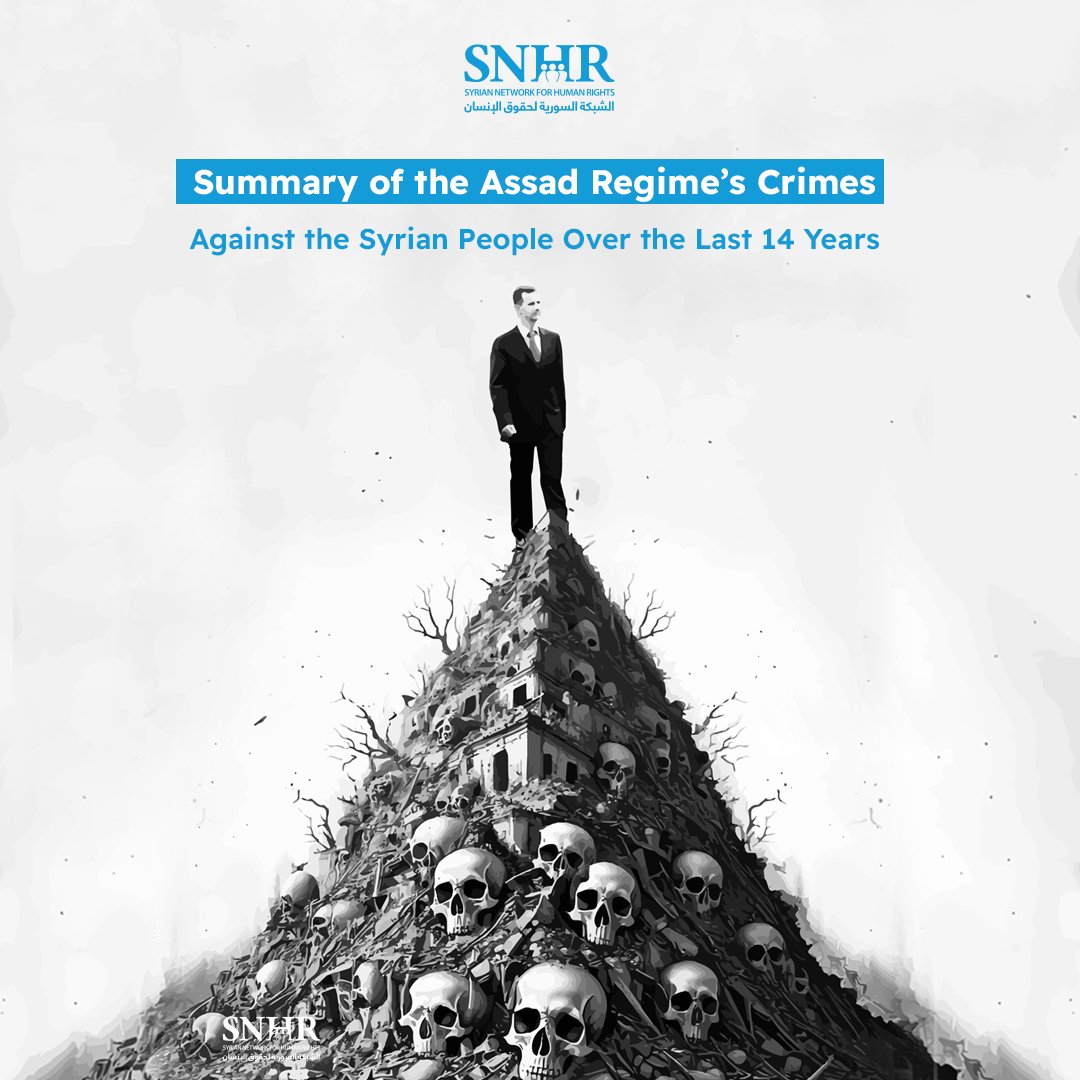
Available In
The Hague – the Syrian Network for Human Rights (SNHR) released a statement briefly summarizing the staggering human and material losses inflicted by Bashar Assad’s regime on the Syrian society and the Syrian state in the last 14 years. The Syrian Network for Human Rights (SNHR) has documented the violations perpetrated by the deposed regime, as well as by other parties, on a daily basis since 2011, in line with its mission to support justice and accountability. This has enabled SNHR to build a database of millions of incidents, reports and cases. Since those early days, the group has released over 1,800 reports and statements to date covering numerous forms of violations suffered by the Syrian people.
Most prominent violations documented
- Extrajudicial Killings
SNHR documented the killing of at least 202,000 civilians at the hands of Bashar Assad’s regime forces, including 23,058 children and 12,010 women.
- Enforced Disappearance
At least 96,321 cases of enforced disappearance at the hands of Bashar Assad’s regime forces are documented on SNHR’s database, among them 2,329 children and 5,742 women.
- Deaths due to torture
At least 15,102 individuals died under torture at the hands of Bashar Assad’s regime forces, including 190 children and 95 women.
- Use of four types of destructive weapons
- Barrel bombs
From July 2012, the Bashar Assad’s regime’s air force dropped at least 81,916 barrel bombs, resulting in the deaths of 11,087 civilians, including 1,821 children and 1,780 women. - Chemical weapons
SNHR documented 217 chemical weapons attacks by Bashar Assad’s regime. The first attack was carried out in Homs’s al-Bayyada neighborhood on December 23, 2012. These attacks killed 1,514 individuals, 1,413 of whom were civilians, including 214 children, and 262 women, in addition to injuring 11,080 others. - Cluster munitions
SNHR documented 252 cluster munition attacks by Bashar Assad’s regime forces from their first use of these weapons in July 2012. These attacks resulted in the deaths of 835 individuals, including 337 children and 191 women. - Incendiary weapons
SNHR recorded at least 51 incendiary attacks on civilian areas from March 2011.
- Forced displacement
Between 2011 and 2024, extensive violations on a vast scale by the former Bashar Assad’s regime and its allies, led to the internal displacement of approximately 6.8 million Syrians, with another seven million Syrian refugees seeking asylum abroad, according to the Office of the UN High Commissioner for Refugees (UNHCR). The deposed regime and its allies not only inflicted incalculable levels of destruction and displacement, but also enacted laws violating fundamental human rights specifically to seize the properties of displaced persons and refugees.
SNHR also documented numerous other types of violations, including the destruction of hundreds of vital facilities, such as hospitals, schools, mosques, churches, and many more.
The statement also provides a number of recommendations
Recommendations
Future Syrian government
- Commit to transitional justice principles
Ensure fair and transparent trials for Bashar al-Assad and all those accused of grave violations against the Syrian people in a way that achieves justice and restores trust in the judicial system. - Separate the judiciary from the executive branch of government
Guarantee judicial independence to ensure fair accountability for all parties responsible for human rights violations and prevent future crimes. - Compensate and rehabilitate victims
Develop comprehensive programs to provide financial and moral compensation to victims and their families, including psychological and social support. Also, establish mechanisms to assist survivors of torture and enforced disappearance. - Rebuild affected areas
Implement well-planned strategies for reconstruction of areas destroyed by the conflict, prioritizing the needs of local residents and ensuring their ability to return to their homes in a safe and dignified manner. - Form a national truth and reconciliation commission
Establish an independent committee to collect facts about the violations that took place, taking care to involve survivors and representatives of civil society in order to ensure comprehensive documentation of all crimes, and provide recommendations for institutional reform.
Russian government
- Re-evaluate the asylum granted to Bashar al-Assad
Review the asylum status currently granted to Bashar al-Assad, as this contradicts the Russian state’s international commitments to hold perpetrators of crimes against humanity accountable. - Cooperate with international justice efforts
Assist in delivering Bashar al-Assad to future Syrian authorities or competent international courts in accordance with international law. - Compensate the Syrian people for the massive damage caused by Russian military intervention
Contribute to Syria’s reconstruction as part of its responsibility for the human and material losses resulting from its direct involvement.
International community
- Lift sanctions on Syria and support credible and reliable civil society initiatives.


